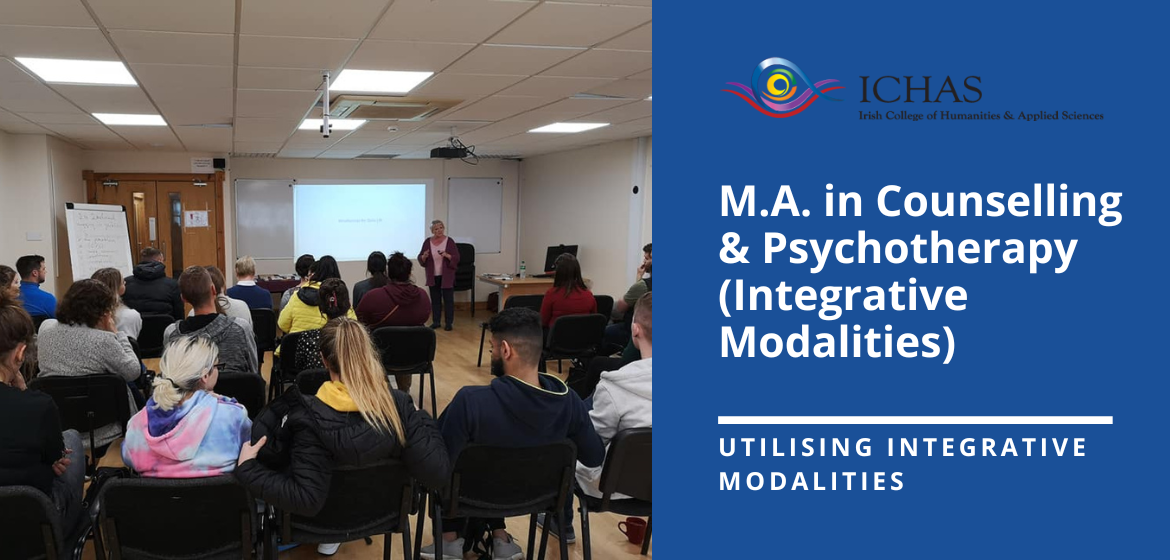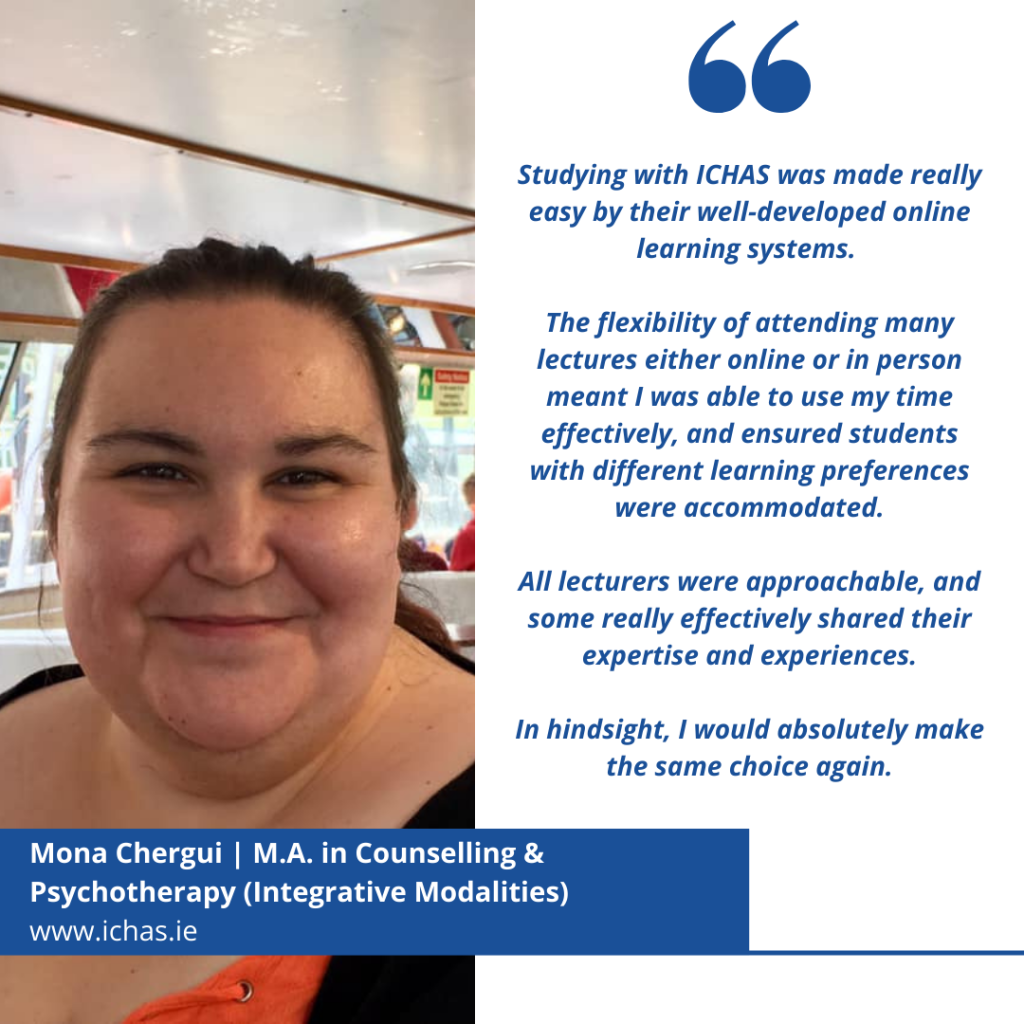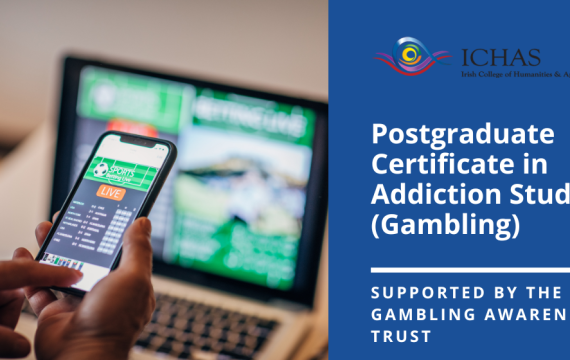
M.A. in Counselling & Psychotherapy (Integrative Modalities)
This Masters programme in Counselling and Psychotherapy (Integrative Modalities) is designed for graduates in health and human sciences and in particular graduates of Counselling and psychotherapy related programmes as well as disciplines such as, nursing, social care, social work, psychology and programmes in cognate areas who wish to expand their knowledge and understanding of the human condition and the contribution of Advanced level Counselling and Psychotherapy practice utilising integrative modalities.
This programme is for people who have a desire to be leaders and agents for change; recognising the special contribution of professional counsellors and psychotherapists using a range of scientifically established paradigms and approaches can make to individuals, their families and communities in supporting individual recovery, wellbeing and also at policy and preventative levels in terms of public health models, thus enriching the lives of individuals and communities.
This programme enables learners to critically evaluate institutionalised practices and values, and act as agents for challenge and change in their professional contexts. The programme addresses the needs of practitioners and graduates who wish to develop their professional competence in the areas of Counselling & Psychotherapy through advanced study in person-centred modalities, and through the professional placement and research elements, develop personal and professional capacity and collaborative problem-solving skills, underpinned by evidence-based practice and reflection.
This programme facilitates graduates of programmes in cognate areas who wish to study towards and meet professional Counselling and Psychotherapy Accreditation requirements of the EAP in relation to Psychotherapy accreditation.
-
Award Title: M.A. in Counselling & Psychotherapy (Integrative Modalities)
-
Duration: 2 Years (Part Time)
-
Tuition Fees: €7,800
-
Start Date: September 2024
This programme addresses the needs of practitioners and graduates who wish to develop their professional competence in the areas of Counselling & Psychotherapy through advanced study, and through the professional placement and research elements, develop personal and professional capacity and collaborative problem-solving skills, underpinned by evidence-based practice and reflection.
The programme is designed primarily for graduates in health and human sciences and in particular graduates of counselling and psychotherapy related programmes as well as graduates of disciplines such as, nursing, social care, social work, psychology and programmes in cognate areas who wish to expand their knowledge and understanding of the human condition and the contribution of advanced level Counselling and Psychotherapy practice.
It is taught using a combination of classroom-based and skill-based learning in practice settings. The programme utilises Blended learning for theoretic elements of engagement and thus allows the learner to access classes in person or using on-line facilities to allow for a better work/life/study balance while equipping the learner with the confidence, skills and competencies to work in the area of Counselling & Psychotherapy.
Successful completion of the programme provides learners with a QQI awarded Masters qualification in Integrative Modalities of Counselling & Psychotherapy. It is especially suited to those who work with (or seek to work with) individuals, families and communities exposed to or experiencing psychological/psychosocial challenges in a range of health or social care environments and enable them to specialise, lead and work for better outcomes for individuals with complex needs.
The programme responds to the increasing and expanding demand for evidence-based practice using recognised modalities of Counselling & Psychotherapy. More fundamentally it also equips leaders in the field of Counselling & Psychotherapy to respond to ever-changing social and cultural needs and to act autonomously in often unpredictable and ill-defined professional contexts.
Moreover, it enables students to employ counselling & psychotherapy competencies as tools for prevention and rehabilitation/recovery, based on Integrative philosophies by creating and modelling learning opportunities where all learners can participate successfully within the context of their own strengths and abilities.
This course will facilitate graduates of undergraduate counselling & psychotherapy related programmes as well as those from cognate areas or applicants with appropriate professional training (through RPL routes) who wish to study towards the completion of Level 9 studies on a programme that has been benchmarked against both the training standards set by the European Association of Counselling (EAC) and the European Association of Psychotherapy (EAP).
Completion of the programme will assist graduates who wish to meet professional accreditation requirements for professional practice.
Further information is available in the Structure tab.

Structure of Course
On acceptance of their place on the course, learners would be required to attend for an induction day. This covers all aspects of the programme content, delivery, assessment, and requirements. Induction provides the learner with an opportunity to become familiar with the environment, peers, and faculty members.
All learners complete this course on a part-time basis over 2 years only. Attendance would normally require attendance in person (either in class or on Zoom) on 1 evening per week (6 pm to 10 pm) and Saturdays (9.30am to 4.30 pm) over 3 semesters in the academic year. The timetable has been structured to optimise the utilisation of online learning via Zoom where this allows, but skills-based components do require a certain amount of in-person attendance . This allows the learner the flexibility to access classes in person or using on-line facilities. In certain skill-based modules, attendance will be a mandatory requirement.
The following are the modules that have to be completed on this course which means a total of 90 ECTS have to completed for the Award of MA in Counselling and Psychotherapy ( Integrative Modalities)
| Name of Module | Semester | Mandatory / Elective | ECTS (Credits) |
| Theoretical Perspectives of Integrative Counselling & Psychotherapy | 1 | M | 5 |
| Research Methodologies & Design | 2 | M | 10 |
| Skills & Competencies in Integrative Counselling & Psychotherapy | 1 | M | 5 |
| Interpersonal Relational Process in Individual and Group Integrative Counselling & Psychotherapy | 2 | M | 5 |
| Understanding Psychopathology | 2 | M | 5 |
| Elective | 4 | M | 5 |
| Knowing Self | 1-4 | M | 5 |
| Applications of Integrative Counselling & Psychotherapy | 1 | M | 5 |
| Practicum | 5 | M | 15 |
| Dissertation | 5 | M | 30 |
Semester 1
Each learner would study and submit for assessment 3 Modules in Semester 1 (15 ECTS). The focus of these modules are designed to provide learners with a fundamental understanding of the Principles and Practices of a range of Psychotherapeutic approaches (5ECTS), Skills and Competency focused learning (5 ECTS), the application of a range of modalities of practice (5ECTS) and are assessed on this work within the same Semester. Learners will also commence their ‘Knowing Self’ Module in Semester 1 and complete it in Semester 4 (5ECTS).
Semester 2
Learners will take a total of 20 ECTS of material, which focuses on Group Work as applied within a range of Modalities (5 ECTS). In addition, learners take a shared module to focus on Understanding Psychopathology (5ECTS) and commence their Practicum (Work-Based Learning) module, in which they are required to engage in 200 Hours of clinically supervised (Modality Specific) direct client work. This is a linear Module (15ECTS) and assessment of this occurs on a continuous basis until the end of Semester 5.
In Semester 2, learners are also taught a 10 ECTS Module on Research Methodologies and Design to support them with their Dissertation Module which commences in Semester 2 and is due for completion and submission in Semester 5.
Semester 3
Students continue to engage in Placements (Work Based Learning) and Knowing Self during Semester 3 (summer semester).
Semester 4
learners take a 5 ECTS Elective Module in this semester, where they can choose a theoretic Module associated with the Other Streams or one 5 ECTS Module from a list of common Elective Modules and submit assessments for the Knowing Self module.
Semester 5
In Semester 5 learners will complete their Practicum (Work-Based Learning) (15 ECTS) and their Dissertation(30ECTS).
How are learners assessed on this course?
This course has been designed to enable learners to demonstrate their academic and reflective learning in appropriate ways. Through a range assessment tools and approaches to allow for assessment of differing learning outcomes as well differing learning styles and situations. The range of assessment tools/ tasks normally include:
- Written Assignments (e.g. Essay, Written Report, Research Proposal)
- Projects (Individual and Group)
- Practical Assignments
- Individual and group presentations
- Terminal Examinations
- Learning Journals or Portfolios
At the start of each academic year, learners also receive a Programme Handbook, which supplements the Student Handbook. The Programme Handbook contains the specific academic information relevant to the individual’s programme, module descriptors, learning outcomes, associated assessment strategies, book lists, and academic calendars are published on the LMS.
What supports are available to learners
At ICHAS, every lecturer and member of staff is committed to excellence in education and professional practice. Each Module has a Module Leader who works with learners to enhance their learning and will provide formative and summative feedback throughout every module. Each programme has a Programme Co-ordinator and in addition, you will have direct access to the Programme Leader and the Director of Graduate Studies.
The Dissertation and Practicum are central elements of the Masters programme. Each learner will undertake these modules under the direction of an Academic and Practicum supervisor respectively for these modules.
Who Awards My Qualification?
On successful completion of the programme, your qualification is awarded by Quality and Qualifications Ireland (QQI). QQI is one of the principal Irish awarding bodies for 3rd level education in Ireland and sets the standards for awards on the NFQ. Because this programme is both validated and awarded by QQI, the Award you receive is recognised in Ireland and internationally. See www.qqi.ie for further information.
Where Can I progress to on completion of the course?
On successful completion of the MA in Counselling & Psychotherapy, learners will be qualified to access Level 10 Programmes on the National Framework of Qualifications (NFQ).
What are the entry requirements for this course?
This programme is designed for graduates in health and human sciences and in particular graduates of Counselling related programmes as well as, nursing, social care, social work, psychology and programmes in cognate areas who wish to expand their knowledge and understanding of the human condition.
The knowledge, skills and competence required to successfully participate in and complete this Level 9 Programme will normally require applicants to have successfully achieved a Level 2:2 award in a relevant Human Science Level 8 degree.
Those who have completed other relevant education programmes or have relevant professional experience etc., where Recognised Prior Learning (RPL) and Acquired Prior Learning (APL) can be applied to the programme by submission of programme content, qualification and assignments equivalent to an appropriate Level 8 award at an Honours 2:2 standard can also be considered. If you wish to apply for this programme, please click on the ‘Apply Now” tab. All applicants undertake a selection interview to support applicants to make an informed decision regarding their choice of programme and to ensure suitability.
Applicants should be driven by a desire to be leaders and agents for change; recognising the special contribution that professional psychotherapists using an Integrative approach can make to individuals, their families and communities in supporting individual recovery, wellbeing and also at policy and preventative levels in terms of public health models, thus enriching the lives of individuals and communities. Candidates will be required to attend for interview to ascertain their suitability for the programme.
Successful applicants would be required to complete Garda Vetting at the College.
If you have any queries in relation to this course then please contact the college on 061 216288 or email us on info@ichas.ie. A member of the Admissions team will be happy to assist you
This course has a curricular structure that provides a modularised and scaffolded developmental structure across the duration of study which is designed to contribute to the requirements of relevant Professional Associations for professional Accreditation in Counselling and/or Psychotherapy.
During the development of this programnme the College were cognisant of the Accreditation requirements of the Association of Professional Counsellors and Psychotherapists; the National Association for Professional Counselling & Psychotherapy as well as the guidance on training standards for Psychotherapy issued by the European Association of Psychotherapy (EAP).
Some other useful features of the course are as follows
- This Programme meets the requirements for professional accreditation with the Association of Professional Counsellors and Psychotherapists; the National Association for Professional Counselling & Psychotherapy
- This programme is congruent with the objective of providing accessible and flexible programmes to adult learners and has been designed with particular emphasis on the use of blended learning technologies to support traditional classroom learning
- This programme supports learners to develop personally & professionally to enable them to achieve a Masters Degree in Counselling & Psychotherapy focusing on Integrative Modalities.
- Develop learners knowledge, skills & competence to an appropriate level of ‘Higher Order Practice’
- Modules within the programme are designed to build personal capacity, collaborative problem-solving skills and an understanding of the systems and context within which individuals may be best supported.
- The programme provides a progression opportunity to complete a range of Programmes at Level 10 nationally and internationally.
This programme is offered on a part basis only and there are options around the payment of tuition fees with payment plans available to learners.
A central component of the ICHAS vision is the provision of flexible and affordable education for all.
The tuition fees for the programme are €7,800 (this includes a 2% PEL levy). In addition, students who opt for monthly instalments will incur an extra fee of €150 to avail of this facility. All fees are fully protected under our Protection of Enrolled Learners’ Policy.
Protection of Enrolled Learners’ Policy. All QQI accredited programmes of education and training of 3 months or longer duration are covered by arrangements under section 65 (4) of the Qualifications and Quality Assurance (Education and Training) Act 2012 whereby, in the event of the provider ceasing to provide the programme for any reason, enrolled learners may transfer to a similar programme at another provider, or, in the event that this is not practicable, the fees most recently paid will be refunded.
Additional Requirements and Costs
Please be aware that Personal Therapy and Clinical Supervision have to be completed as part of the programme and the costs associated with these are extra and not included in tuition fees.
Click to apply for this programme
Available at our Dublin and Limerick CampusesFeatured Courses

Postgraduate Certificate in Addiction Studies (Gambling)
The programme specifically aims to increase practitioner awareness and enhance relevant skills and competencies to engage with those with Gambling Addiction and to support them in their journey towards recovery
FIND OUT MORE
Introduction to Belief and Disbelief in the age of atheism: Psychospiritual Counselling
This course will introduce attendees to some of the skills and techniques adopted by psychospiritual therapists, explore the various philosophies that underpin clinical practice and provide.............
FIND OUT MORE
Introduction to Internal Family Systems
Over 3 evenings the course will look at the background and key aspects of Internal family systems and how it can help practitioners to understand themselves and their clients more completely. It will have both didactic and interactive elements and will focus on how...............
FIND OUT MORE























